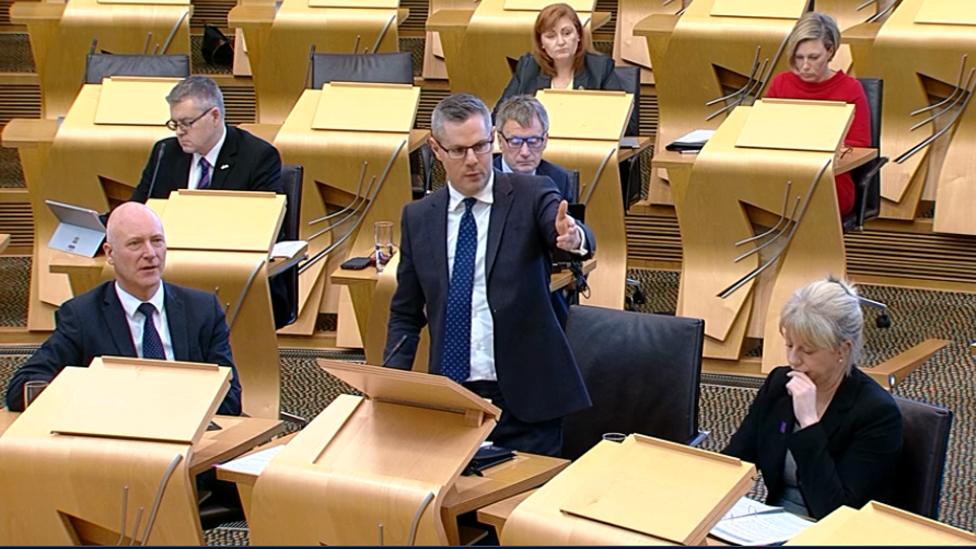Scottish budget given final approval at Holyrood
- Published
- comments

Finance Secretary Derek Mackay won the support of the Scottish Greens for his budget after weeks of talks
The Scottish government's tax and spending plans for the next year have passed their final parliamentary hurdle.
The budget includes major changes to Scotland's income tax rates and bands, which will see middle and high earners pay more and lower earners pay less.
The minority SNP government struck a deal with the Scottish Greens last month that gave them enough support to pass the budget.
The final vote was 70 to 56.
The deal agreed with the Greens saw the party's six MSPs support the budget in return for a package which includes £170m more for local councils than had originally been proposed.
It will also see all public sector pay employees who earn up to £36,500 receiving a minimum 3% pay increase.
Among the other measures included in the budget are:
An extra £400m for the health service - £200m more than the amount needed for NHS spending to keep pace with inflation
£243m towards the goal of providing 1,140 hours of free pre-school childcare per year
Funding to reduce the attainment gap in Scottish schools increased from £170m to £179m
Full relief from LBTT - the Scottish equivalent of stamp duty - on up to £175,000 for first time home buyers
But it is the income tax changes - which were approved in a separate vote on Tuesday - that have caused the most controversy.
The new five-band system, which will come into force from 1 April, will create a 19p "starter" rate for lower earners and a 21p "intermediate" rate for those earning more than £24,000.
The changes will also add 1p to each of the higher and additional rates, making them 41p and 46p respectively.
And the deal with the Greens means that the higher rate threshold will be set at £43,431 rather than the £44,274 that had originally been proposed by Finance Secretary Derek Mackay.
The changes mean that someone earning £15,000 in Scotland will pay £1.67 less in tax every month than someone earning the same salary in England, while someone earning £25,000 would pay 83p a month less.
However, someone earning £35,000 will pay £7 a month more than a person on the equivalent salary south of the border, while those earning £45,000 will pay £42 a month more and someone earning £150,000 will pay £161 a month more.
The Scottish government says 70% of Scottish taxpayers will pay less than they did last year, while about 55% will pay less than they would if they lived elsewhere in the UK.
That does of course mean 30% will pay more than they did last year - and 45% will pay more than they would if they lived south of the border.
You can get an idea of how the changes will affect you by using our online income tax calculator.
What does Mr Mackay say about his budget?
Speaking in the final debate, Mr Mackay said the bill was "of huge importance to Scotland", thanking "those who have engaged constructively".
He said his budget would "use Scotland's devolved powers responsibly in a fair way", saying the tax moves would make Scotland "the fairest-taxed part of the UK".
The finance secretary said businesses were more concerned about Brexit than about his tax plans, saying the budget would "prevent the negatives that come from Westminster austerity" and "deliver stimulus, sustainability, and a stronger society".
What do the other parties say?
The Scottish Conservatives have warned of the dangers of "taking money out of people's pockets" at a time of low economic growth - while Labour and the Liberal Democrats argue that the tax changes do not go far enough.
All three of the parties opposed the budget in the final vote, with the exception of the Lib Dem MSPs for Orkney and Shetland, Liam McArthur and Tavish Scott.
Mr McArthur and Mr Scott joined the SNP and Greens in voting in favour of the budget because it includes additional funding for ferry services in the islands.
Scottish Greens co-convener Patrick Harvie said the concessions his party had won in return for its support meant that "the £157m of local government cuts proposed by the SNP" had been "more than reversed".
However he spoke at length about wanting more reform to local government finance going forward, saying the Greens would want to see "meaningful progress" on this front - including a "full replacement" of the council tax - before they entered into any future budget talks.
Scottish Conservative finance spokesman Murdo Fraser said MSPs were looking at a "pay more, get less" budget, referring to the deal with the Greens as "Patrick's pocket money".
He told Mr Mackay that the tax proposals sent out the message that Scotland would be the most-taxed part of the UK, saying: "If you grew the economy, you'd have more money to spend".
Scottish Labour said the additional £170m for local authorities in the budget was still £386m short of the £545m that Cosla says councils need to maintain current levels of services.
The party's finance spokesman James Kelly said the budget "fails the need of Scotland's communities", calling the agreement with the Greens a "grubby deal" which displayed "poverty of ambition".
Scottish Liberal Democrat leader Willie Rennie described the budget as being "based on a broken promise", referring to an SNP manifesto commitment not to raise taxes for basic rate payers. He also praised the work of his own MSPs, insisting they were responsible for winning extra funding for ferry services.